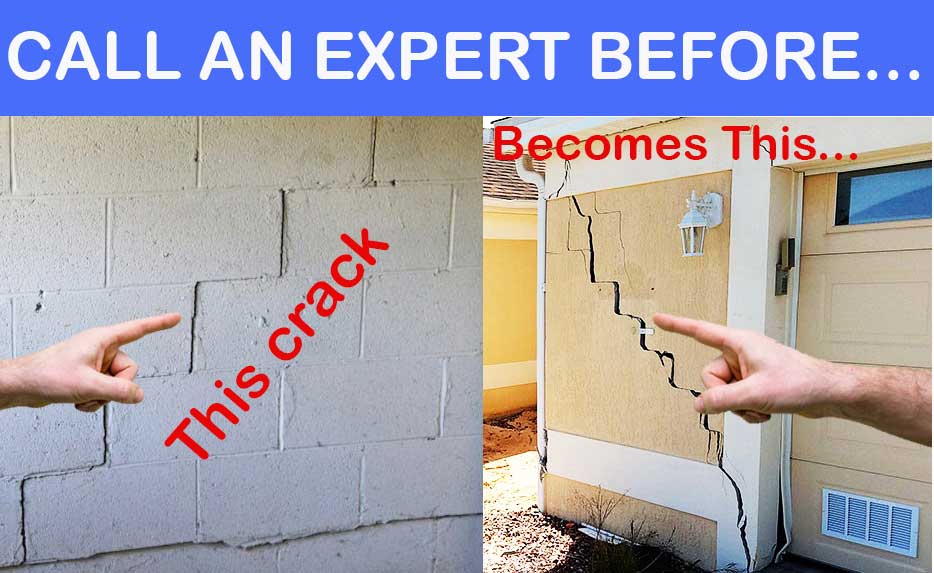Consultation Services
Property Foundation Free Consultations!
FOUNDATION CONSULTATIONS
We test, examine and inspect home foundations. We can address your house foundation and slab foundation issues for free. If you have cracks in your home foundation or structure, please give us a call, We can help you to identify the problem.
Protect Your Lovely Home From Damages In Florida!
We provide virtual and physical foundation inspections!
FREE CONSULTATIONS!
Florida Statewide


Inside and Outside of The Property
Why you need consultations?
WE DO FOUNDATION CONSULTATIONS FLORIDA STATEWIDE!
INSTANT FREE VIRTUAL FOUNDATION INSPECTION
We Are a Registered Company
Remote Observation
Free Live Overview
- Simple Overview of Cracks
- Free Advanced Advices
- Zero Solicitations
In-Person Inspection
On-Site Inspection
- In-Person Inspection
- Foundation Cracks Tracking
- Official Report With Details
- Statewide Service
Geotechnical Inspection
Technical Engineering Inspection
- In-Depth Inspection
- Valid Geotechnical Report
- Most Advanced Technology
To Save Your Home Value
We Provide The Best Service In Industry
Many homes suffering from foundation damages per year in Florida!

Do cracks in walls indicate a structural problem?
Most small cracks in drywall or plaster walls are not serious Sinkholes House and are caused by seasonal expansion and contraction of the wood framing in your house over time. Larger cracks in your walls, however, can indicate structural or foundation problems.
As you now know sometimes, cracks in your walls are a sign of sinkhole activity on your property. Sinkhole activity is a common problem with the limestone bedrock that lies beneath much of the state of Florida, and sinkhole activity is a problem on your property specifically when cracks in your exterior walls appear. Just give us a call at Foundation Inspection & Repairs Florida to see how we can help you!
The Most Common Signs Of A Foundation Issue Are:
- A round circular depression in the earth
- A circular lake (or a large, deep puddle)
- A foundation settling
- Cracks in roads or pavement
- A sudden drop in well water levels on a site
- Rainwater disappearing into ground openings
- Localized subsidence or depression anywhere on the property

NEED CONSULTATION?
WE ARE LICENSED PROFESSIONALS
Why my house has cracks in the walls?
Cracks in the walls of a house can occur due to various reasons, some of which are:
Settlement: Most houses settle over time, especially if they are newly constructed. This settling process can cause minor cracks as the building materials adjust to their new positions.
Soil Movement: Changes in the soil beneath the foundation can lead to shifts and movements in the structure, resulting in cracks in the walls.
Temperature Changes: Fluctuations in temperature can cause materials to expand and contract, leading to cracks in walls, especially in regions with extreme weather conditions.
Moisture: Water infiltration through leaks in the roof, plumbing issues, or poor drainage can weaken the walls and cause cracks, especially in masonry or plaster.
Poor Construction: If the house was not built using proper construction techniques or low-quality materials were used, it could be more susceptible to developing cracks.
Structural Issues: Sometimes, cracks can be indicative of more significant structural problems, such as foundation issues, that require immediate attention.
Earthquakes or Tremors: In earthquake-prone areas, seismic activity can cause substantial damage and lead to cracks in the walls.
To address the issue, it’s essential to identify the root cause of the cracks. If the cracks are minor and superficial, they can often be repaired with simple patching and painting. However, if the cracks are severe or recurring, it’s crucial to consult a professional structural engineer or a qualified contractor to assess the situation properly and recommend appropriate repairs to ensure the safety and stability of your house.
Why houses have cracks in the Florida?
Houses in Florida can experience cracks in their walls due to several factors specific to the region:
Settlement: Florida’s soil can be sandy or expansive, which means it may settle differently compared to other types of soil. As a result, houses in Florida may experience settling, leading to minor cracks in the walls as the building materials adjust.
Subsidence: Some areas in Florida are built on land that was previously wetlands or marshy terrain. When these lands are filled and developed, subsidence can occur, causing the ground to sink and potentially leading to cracks in the house’s foundation and walls.
High Water Table: Many parts of Florida have a high water table due to its flat topography and proximity to the ocean. Excessive moisture can weaken the soil and the foundation, contributing to cracks in the walls.
Climate and Weather: Florida’s climate is characterized by high humidity, frequent rainstorms, and hurricanes. The constant exposure to moisture can lead to water infiltration, which weakens building materials and causes cracks over time.
Sinkholes: Certain regions in Florida are prone to sinkholes, which occur when the ground collapses into underground voids. Sinkholes can result in significant structural damage to buildings, including cracks in walls.
Expansive Clay Soils: Some parts of Florida have clay-rich soils that can expand and contract significantly with changes in moisture levels. This movement can lead to foundation issues and cracks in the walls.
Hurricanes and Storms: Florida is susceptible to hurricanes and strong tropical storms. The powerful winds and debris impact during these events can cause significant damage to houses, including wall cracks.
It’s essential for homeowners in Florida to be vigilant about monitoring their homes for any signs of cracks and addressing them promptly. Regular maintenance, proper drainage systems, and using quality building materials can help mitigate the risk of cracks and other structural issues in houses in Florida. Additionally, consulting with professionals like engineers and contractors can provide valuable insights and solutions to maintain the structural integrity of the house.
what causes cracks in floors?
Cracks in the floor of your house in Florida could be attributed to various factors, some of which are specific to the region:
Settlement: As mentioned earlier, Florida’s soil can be sandy or expansive, and houses may experience settling as the ground adjusts to its new load. Settlement can cause cracks in the floor over time.
High Water Table: Florida’s high water table can lead to increased moisture in the soil, which can weaken the foundation and contribute to floor cracks.
Climate and Weather: The humid climate, frequent rainstorms, and hurricanes in Florida can cause shifts in the ground and potential water damage, both of which can lead to floor cracks.
Subsidence: If your house is built on land that was previously wetlands or marshy terrain, subsidence can occur, causing the ground to sink and potentially leading to floor cracks.
Expansive Clay Soils: If your house is situated in an area with clay-rich soils, the soil’s expansion and contraction with moisture changes can affect the foundation and result in floor cracks.
Poor Drainage: Inadequate drainage around your house can lead to excess water pooling around the foundation, weakening it and causing floor cracks.
Age and Wear: Over time, any house may develop cracks in the floor due to natural wear and tear from foot traffic, settling, and general aging of the materials.
To address the issue of floor cracks, it’s crucial to identify the specific cause in your case. Consider consulting with a professional structural engineer or a qualified contractor who can inspect your house, assess the situation properly, and recommend appropriate repairs. Proper maintenance, drainage improvement, and using suitable building materials can help prevent and minimize future floor cracks in your Florida home.
